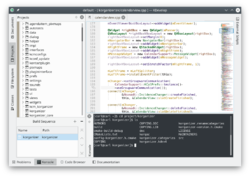KDevelop/de: Difference between revisions
Appearance
Updating to match new version of source page |
No edit summary |
||
| Line 1: | Line 1: | ||
<languages /> | <languages /> | ||
{|class="tablecenter vertical-centered" | {|class="tablecenter vertical-centered" | ||
|[[ | |[[Image:KdevelopWindows.png|250px|thumb|KDevelop Editor-Ansicht]]||'''Eine integrierte Entwicklungsumgebung (IDE) für MS Windows, Mac OS X und Linux''' | ||
|} | |} | ||
| Line 14: | Line 14: | ||
== Features<ref>[https://www.kdevelop.org/features KDevelop feature]</ref> == | == Features<ref>[https://www.kdevelop.org/features KDevelop feature]</ref> == | ||
* | <div class="mw-translate-fuzzy"> | ||
* Unterstützt Ada, Bash, C, C#, C++, D, Fortran, Haskell, Java, Objective-C, Pascal, Perl, PHP, Python, Ruby, SQL, und XUL | |||
</div> | |||
* Support multiple version control systems Git, Bazaar, Subversion, CVS, Mercurial (hg), Perforce | * Support multiple version control systems Git, Bazaar, Subversion, CVS, Mercurial (hg), Perforce | ||
Revision as of 23:04, 23 September 2022
 |
Eine integrierte Entwicklungsumgebung (IDE) für MS Windows, Mac OS X und Linux |
== Geschichte (von Wikipedia inspiriert)
The KDevelop project started in 1998 at the University of Potsdam (Germany). The first released 0.1 was released the same year[1].
KDevelop has experienced several rewrites. The first time was with version 3.x by Bernd Gehrmann in 2001[2] and the second time was with version 4.x with a more object-oriented architecture in 2009[3].
The development of KDevelop 5 started in August 2014 as a port of the KDevelop 4 codebase for qt5 and kf5[4]. The custom c++ parser was abandoned in favor of clang and the CMake interpreter was also replaced in favor of using the JSON metadata given by CMake. KDevelop 5 was released in August 2016[5].
Features[6]
- Unterstützt Ada, Bash, C, C#, C++, D, Fortran, Haskell, Java, Objective-C, Pascal, Perl, PHP, Python, Ruby, SQL, und XUL
- Support multiple version control systems Git, Bazaar, Subversion, CVS, Mercurial (hg), Perforce
- Support multiple build system CMake, QMake, Makefile, Meson[7], ...
- Quick Code Navigation (Jump to declaration/definition)
- Code comprehension (Syntax highlighting, semantic code completion)
- Documentation integration
- Integration support for multiple static analyzers: Clang-tidy, Clazy and the Cppcheck
